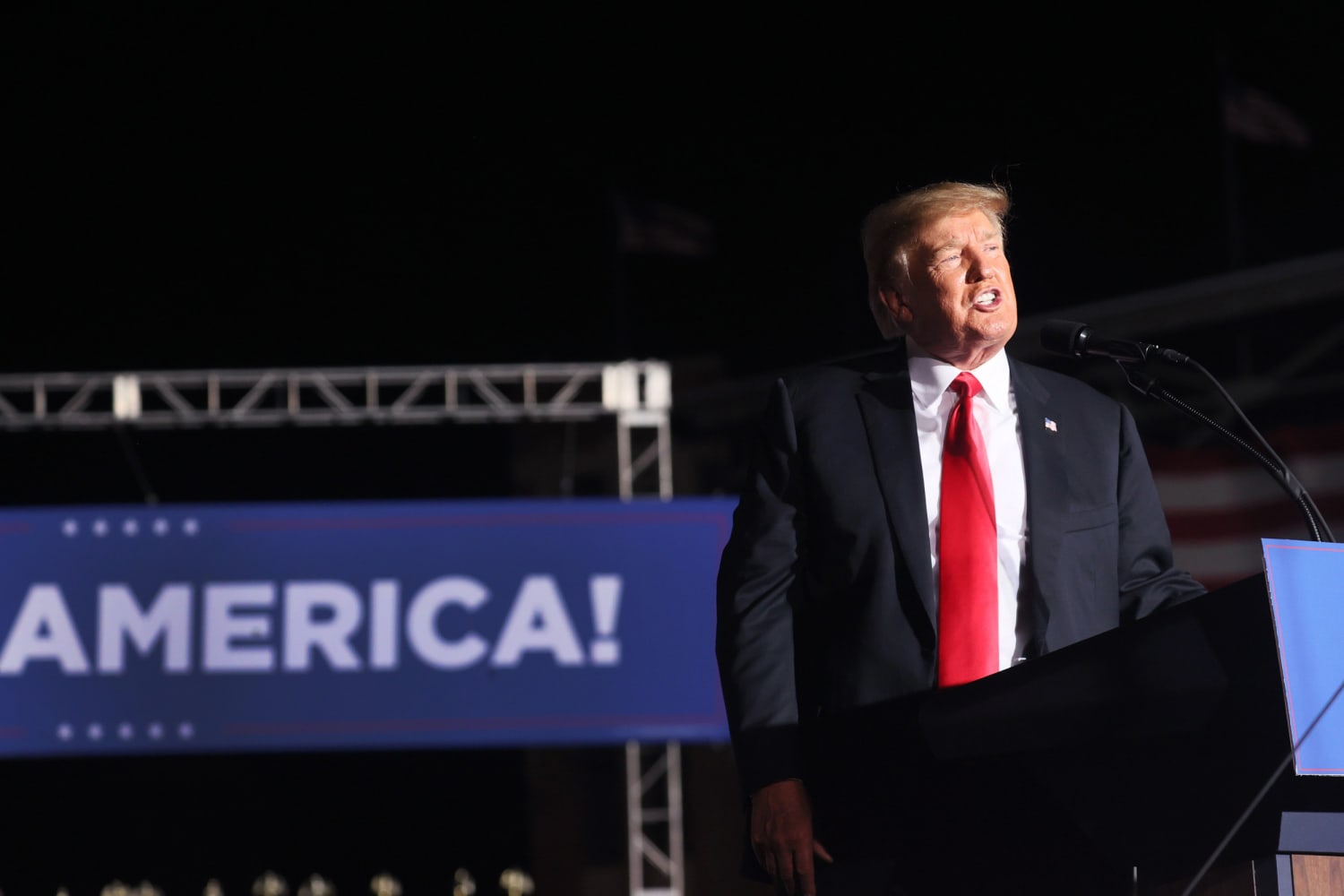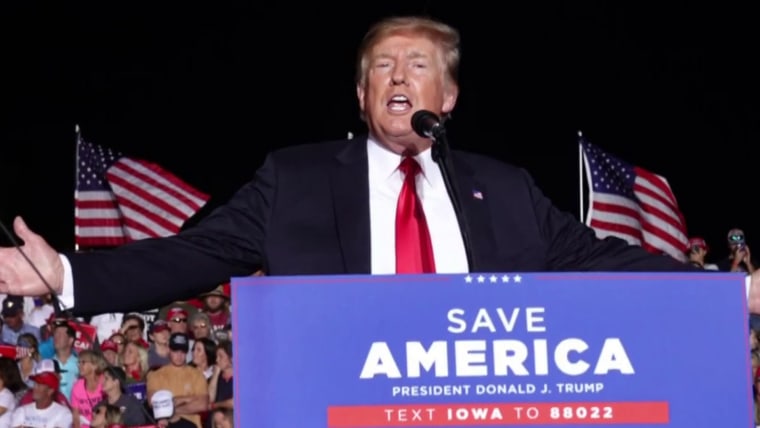The future of U.S. elections is on the ballot in 2022, largely because former President Donald Trump can’t let go of the past.
“The single biggest issue — the issue that gets the most pull, the most respect, the biggest cheers — is talking about the election fraud of 2020’s presidential election,” Trump said last week at a rally in Iowa, again pushing the lie that a second term was stolen from him and that Joe Biden is not the legitimate president.
In next year’s races for governor and secretary of state, for Congress and all the way down to state legislative seats, Republicans eager for Trump’s support have embraced these baseless claims. Democrats, eager to rally their base in a potentially unfavorable political climate, have branded GOP candidates as propagators of “the Big Lie.”
The issue is particularly animating campaigns for secretary of state — the office that in many states oversees elections — in electoral battlegrounds that narrowly backed Biden over Trump in 2020 and will be hotly contested again in the 2024 presidential election.
Consciously or not, voters could render a final judgment on the conspiracy theories that Trump and his allies have spent 11 months nurturing.
“I’m the only candidate in this race who’s willing to stand up all over Ohio, and all over America, and say that I believe the election was stolen from Donald J. Trump,” Josh Mandel, a Republican Senate candidate in Ohio who has made the stolen election lie central to his campaign, told NBC News.
“It’s the right thing to do for our country,” Mandel added, when asked if he worried his position might hurt him in a general election. “And I don’t care how it impacts me politically.”
In Arizona’s race for secretary of state, Trump has endorsed Mark Finchem, a state legislator who promoted a partisan review of Maricopa County’s election results that reaffirmed Biden’s victory. In Georgia, Trump is supporting Rep. Jody Hice in a Republican primary to oust Brad Raffensperger, the secretary of state who resisted Trump’s pressure to rig the state’s 2020 vote in his favor.
“We’re no longer looking at candidates who are attempting to overturn the results of the 2020 election,” Bee Nguyen, a Democratic state representative and candidate for secretary of state in Georgia, said of Republicans running in 2022. “They’re setting us up for 2024.”
Governors’ races have also caught Trump’s attention. In a crowded GOP primary in Arizona, he recently endorsed Kari Lake, a former TV news anchor who has said she would not have certified Biden’s victory. And although he has not yet endorsed a candidate in Georgia, he has vowed to unseat Republican Gov. Brian Kemp, who like Raffensperger refused Trump’s calls to undermine the 2020 result.
“We have people who are running explicitly on the platform that the election results would have turned out different if they were in power in 2020, and I think it’s going to be up to the voters in the place where they do elect their election officials to say, regardless of party, it’s not acceptable to politicize the elections,” Larry Norden, director of the election reform program at the nonpartisan Brennan Center for Justice, said.
In Georgia, Hice has held himself up as an unabashed Trump defender.
“Nobody understands the disaster of the lack of election integrity like the people of Georgia, and now is our hour to take it back,” Hice told the crowd after Trump invited him on stage at his rally last month in the state. “We’ve got incredible leadership from President Trump, and we need this kind of leadership again.”
Trump also is backing Kristina Karamo, a Detroit poll challenger during the 2020 election, for secretary of state in Michigan, where Democratic incumbent Jocelyn Benson and Gov. Gretchen Whitmer are top GOP targets next year. Karamo headlined a rally Tuesday at the Michigan Capitol, where speakers spread disproven voter fraud theories and demanded an Arizona-style election review.
Secretary of state races are typically sleepy affairs, with lesser-known candidates who are dependent on their party’s nominees for governor or Senate to carry them across the finish line. Trump’s involvement could change that, said Trey Grayson, a Republican and former secretary of state in Kentucky.
“He appears to be picking his own team based upon the criteria that I’ll call the lie about the 2020 election,” Grayson added. “I don’t think we’ve ever seen anything like this.”
Arizona Secretary of State Katie Hobbs, a Democrat who is running for governor in 2022, believes there is an “appetite for accountability” that has elevated secretaries of state like her who have pushed back on GOP election lies.
“All of this focus on rehashing the 2022 election based on baseless allegations is holding us back,” she said. “It’s out of touch.”
A Yahoo News/YouGov poll in August found that two-thirds of Republicans believe the last election was stolen from Trump. And there was a deep partisan split in a CNN poll last month that showed 75 percent of Republicans and 46 percent of Democrats said democracy was under attack.
The dynamics could make GOP primaries particularly relevant next year. Steve Bannon, the former Trump adviser who hosts a podcast with a large right-wing audience, has described a candidate’s position on the 2020 election results as a “litmus test” for 2022.
Bannon has welcomed to his show candidates like Finchem and taken an interest in Ohio’s crowded Senate primary, where Trump hasn’t endorsed, but Mandel and other GOP hopefuls have worked strenuously to impress the former president. Mandel, for example, visited Maricopa County during the audit and has won endorsements from Wendy Rogers, an Arizona state senator who championed the audit, and Jenna Ellis, a former Trump attorney known for promoting false election claims.
Mandel, a former state treasurer, also has called for 2020 election reviews in all 50 states, including Republican-controlled Ohio, which Trump won by 8 points. He downplayed the suggestion that, by questioning the validity of election results everywhere, he risks discouraging Republicans from voting.
Trump himself has fed this uncertainty, raising doubts without evidence about whether future elections will be conducted fairly and sending mixed messages about whether Republicans should bother casting ballots.
“If we don’t solve the Presidential Election Fraud of 2020, Republicans will not be voting in ʼ22 or ʼ24,” Trump said in an emailed statement Wednesday. “It is the single most important thing for Republicans to do.”
Nate Persily, an election expert and professor at Stanford Law School, doesn’t believe that the false claims of widespread voter fraud will depress GOP turnout.
“The allegations of voter fraud are more about defining a set of beliefs for a political tribe than it is about persuasiveness, trying to persuade a group about the utility of their vote,” Persily said. “I have not seen evidence in the U.S. that those kinds of messages lead to demobilization.”
Source: | This article originally belongs to Nbcnews.com











